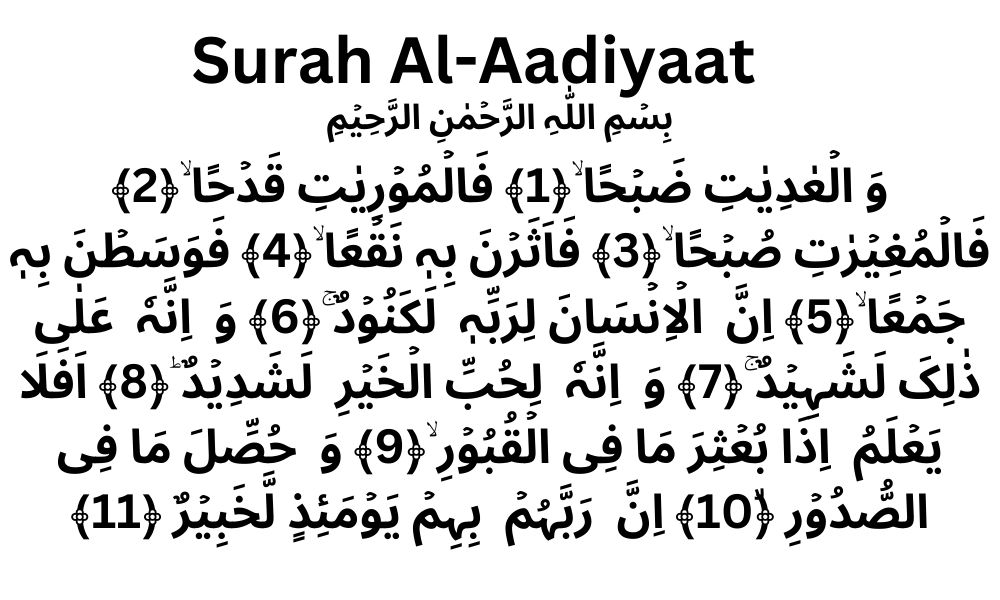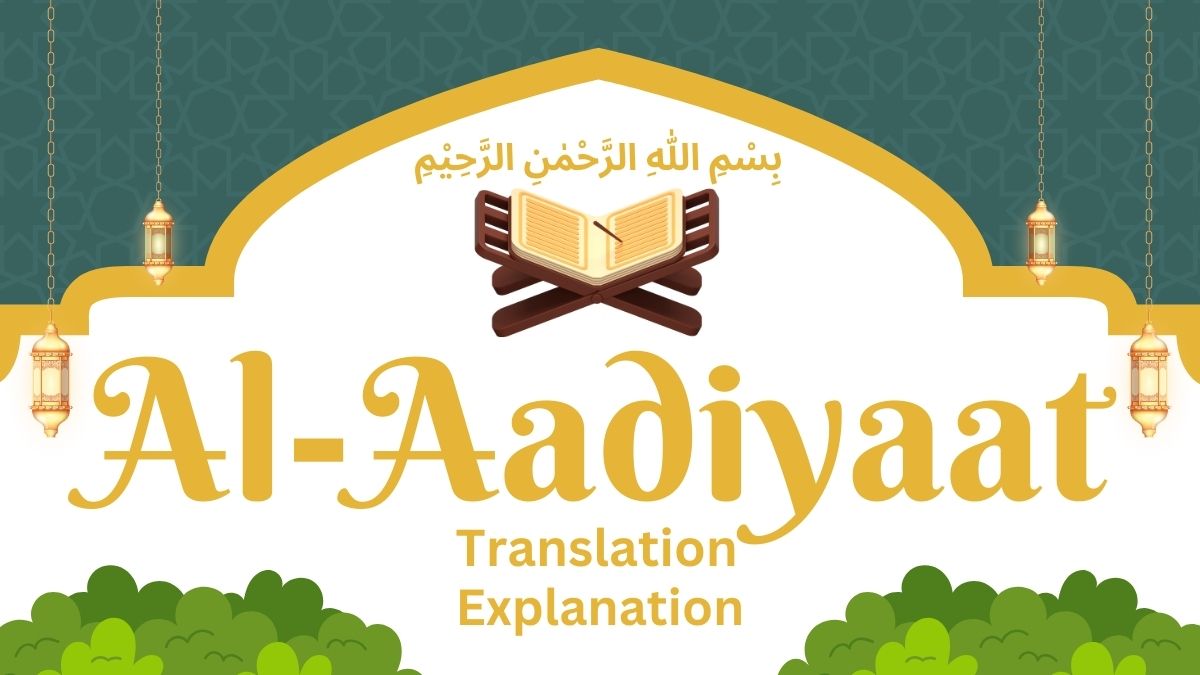Surah Al-Aadiyaat Chapter:100 Arabic

Surah Al-Aadiyaat Chapter:100 Translation
- By those horses that run panting .
- Then the Joe (from their tops) blow sparks .
- Then invade in the morning .
- Then blow the dust on this occasion .
- Then at the same time they wander in the middle of a enemy army .
- Verily man is very unthankful to his Lord .
- And he himself is a witness of this .
- And the fact is that he is very mature in the love of wealth .
- Does he not know the time when what is in the graves will be scattered outside .
- And whatever is in the breasts will be revealed .
- Certainly, their Lord will have complete knowledge of them on that day .
Surah Al-Aadiyaat Explanation
Surah Al-Aadiyaat Chapter:100 Verse 1 Explanation
The verse does not clearly indicate whether “those who run” refers to horses; it simply uses the term wal-adiyat. This has led to differing interpretations among commentators. Some of the companions and their immediate successors believe it refers to horses, while others think it refers to camels.
However, since the unique sound known as dabh is produced only by panting, snorting horses, and the subsequent verses mention striking sparks, raiding at dawn, and raising clouds of dust actions more closely associated with horses most scholars lean towards the interpretation that it refers to horses.
Ibn Jarir suggests that the view identifying “those who run” as horses is preferable, as camels do not exhibit heavy breathing when they run; it is the horse that does. Allah has stated: “By those runners which pant and breathe hard in running.” Imam Razi supports this interpretation, noting that the sound of dabh is exclusive to horses, and the act of striking sparks with their hooves is also linked to them. Additionally, raiding at dawn is more effectively accomplished on horseback than with other animals.
Surah Al-Aadiyaat Chapter:100 Verse 2 Explanation
Strike sparks: this means that the horses run in the dead of night, as the sparks from their hooves are only noticeable after dark.
Surah Al-Aadiyaat Chapter:100 Verse 3 Explanation
The custom among the Arabs was to set out on a raid during the night to catch the enemy off guard. They would then launch a sudden attack at dawn when everything was visible in the daylight, but not so bright that the target could see them coming from afar and prepare for the assault.
Surah Al-Aadiyaat Chapter:100 Verse 6 Explanation
This passage speaks of an oath taken by horses that run with heavy breaths, creating sparks at night, and kicking up dust as they charge towards a settlement at dawn, penetrating the enemy ranks. It’s interesting to observe that many commentators interpret these horses as representing the steeds of Muslim fighters, while the enemy host symbolizes the disbelievers. However, the oath emphasizes humanity’s ingratitude towards their Lord.
Clearly, the swift advance of the fighters’ horses and their sudden attack on the disbelievers during Jihad for Allah does not illustrate human ingratitude, nor do the subsequent statements about man’s love for worldly wealth apply to those who fight for Allah’s cause. Thus, one must conclude that the oaths in the first five verses of this Surah actually refer to the widespread violence, looting, and plundering that was common in Arabia at that time.
In the pre-Islamic era, nights were filled with dread: people from various tribes and settlements feared sudden attacks from unknown enemies. When dawn broke, they would breathe a sigh of relief, grateful that the night had passed without incident. Tribes engaged not only in retaliatory wars but also in raids against one another, seeking to seize goods, livestock, and capture women and children to enslave them.
This tyranny and plunder were often executed on horseback, which serves as a reminder of humanity’s ingratitude towards its Creator. The very powers that man uses for violence and theft were not bestowed upon him by God for such purposes. It is indeed a profound ingratitude to utilize the resources and strength granted by Allah to spread chaos and corruption on earth, which is something He detests.
Surah Al-Aadiyaat Chapter:100 Verse 7 Explanation
His own conscience and actions bear witness to this; however, there are many disbelievers who openly express their ingratitude with their words, as they do not even believe in the existence of God, let alone recognize the blessings for which they should be grateful to Him.
Surah Al-Aadiyaat Chapter:100 Verse 8 Explanation
He is indeed very passionate about khair. However, the term khair in Arabic encompasses not just goodness and virtue, but also worldly wealth. In Surah Al-Baqarah, Ayat 180, khair is specifically referenced in relation to worldly wealth. The context helps distinguish when khair refers to goodness and when it pertains to material possessions.
In this verse, it is clear that khair signifies worldly wealth rather than virtue. It would be inaccurate to claim that a person who is ungrateful to his Lord and demonstrates this through his actions is truly passionate about goodness and virtue.
Surah Al-Aadiyaat Chapter:100 Verse 9 Explanation
This means that the deceased will be resurrected as living beings from whatever state they may be found buried in the ground.
Surah Al-Aadiyaat Chapter:100 Verse 10 Explanation
All intentions, aims, ideas, thoughts, and motives behind actions that are concealed in people’s hearts will be revealed and scrutinized to distinguish between good and evil. In other words, judgment will not be based solely on the visible and superficial actions of a person, but also on the hidden secrets of their hearts, which will be examined to understand the intentions and motives behind their actions.
If one reflects on this, it becomes clear that true and complete justice can only be achieved in the court of God. Secular laws also recognize that a person should not be punished solely based on their outward actions; the motives behind those actions should also be considered and evaluated. However, no court in the world can accurately determine a person’s motives and intentions.
Only God has the ability to examine the true motivations behind every action of humanity and to decide the appropriate reward or punishment. As indicated in the verse, this judgment will not rely solely on Allah’s existing knowledge of our intentions and motives; rather, on Resurrection Day, these hidden truths will be revealed and laid bare for all to see. After a thorough examination in the divine court, it will be made clear what was good and what was evil.
This is why the phrase hussila ma fissudur is significant. Tahsil refers to bringing something to light and distinguishing between different elements. Therefore, using tahsil in relation to the concealed secrets of the heart implies both revealing them and differentiating between good and evil. This concept is echoed in Surah At-Tariq, which states: The Day the hidden secrets are scrutinized (verse 9).
Surah Al-Aadiyaat Chapter:100 Verse 11 Explanation
In other words, He will know exactly who deserves what in terms of punishment or reward.
Read Surah Al-Zilzaal Click Here.
